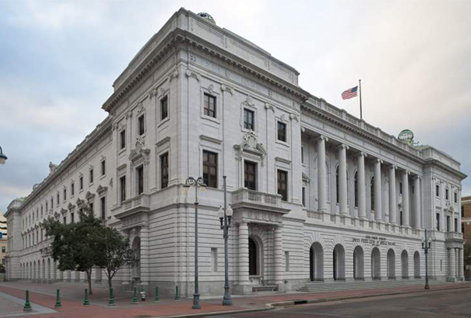© 2012 The Texas Lawbook. Content of The Texas Lawbook is controlled and protected by specific licensing agreements with our subscribers and under federal copyright laws. Any distribution of this content without the consent of The Texas Lawbook is prohibited.
By David S. Coale
Special Contributor to The Texas Lawbook

The five important business cases from the U.S. Court of Appeals for the Fifth Circuit in the first half of 2012 show a pragmatic, step-by-step approach to business cases.
In those opinions, the Court carefully tested whether an arbitration clause comported with basic principles of contract law, parsed each line of a pleading to test its sufficiency, enforced each element of the basic test for personal jurisdiction, and methodically applied Daubert to complex expert testimony.
These five cases illustrate the work of a court that takes seriously the “blocking and tackling” basics of commercial disputes.
1. Unenforceable Arbitration Clause. The employee handbook in Carey v. 24 Hour Fitness contained an arbitration provision and a “Change-in-Terms” clause giving the employer “the right to revise, delete, and add to the employee handbook.” 669 F.3d 202 (5th Cir. 2012). The Court affirmed a finding that the arbitration provision was illusory, and thus unenforceable. Id. at 204 (citing Morrison v. Amway Corp., 517 F.3d 248, 257 (5th Cir. 2008)). The Court contrasted In re Halliburton, 80 S.W.3d 566, 569-70 (Tex. 2002), which enforced a clause when the employer’s right to amend it was specifically limited as to current disputes, and favorably cited Weekley Homes v. Rao, 336 S.W.3d 413, 415 (Tex. App.–Dallas 2011, pet. denied), in which a provision requiring notice of a handbook change was not enough to make an arbitration provision non-illusory. While this case arose in an employment dispute, its analysis may provide guidance in similar situations such as on-line service agreements.
2 and 3. A Practical Guide to Twombly and Iqbal. Federal Rule of Civil Procedure 8(a) requires a “short and plain statement of the claim showing that the pleader is entitled to relief.” The Supreme Court holds that Rule 8(a) requires more than conclusory statements. See Bell Atlantic v. Twombly, 550 US 544 (2007); Ashcroft v. Iqbal, 556 U.S. 662 (2009). In contrast, Rule 9(b) requires that “[i]n alleging fraud or mistake, a party must state with particularity the circumstances constituting fraud or mistake.” To meet this “particularity” standard, the Fifth Circuit “require[s] a plaintiff pleading fraud to specify the statements contended to be fraudulent, identify the speaker, state when and where the statements were made, and explain why the statements were fraudulent. . . . the who, what, when, where, and how of the events at issue.” E.g., Dorsey v. Portfolio Equities, 540 F.3d 333, 339 (5th Cir. 2008). Two recent cases show some overlap between Rule 8(a) and Rule 9(b).

The plaintiff in Patrick v. Wal-Mart alleged: “Defendants have engaged in a continuing pattern of bad faith . . . [and] have among other things, unreasonably delayed and/or denied authorization and/or payment of reasonable, necessary and worker’s comp related medical treatment, as well as permanent indemnity benefits, as ordered by [the state agency].” No. 11-60217, slip op. at 11-12 (May 17, 2012). The Court found that this allegation “invokes three potentially cognizable theories of liability,” but was “devoid of facts to make it plausible” under Twombly — the pleading “fails to identify the specific time or nature of such wrongs . . . [and] does not identify by date or amount or type of service, any of the alleged bad-faith denials and delays . . . .” Id.
The plaintiff in Bowlby v. City of Aberdeen alleged a denial of procedural due process and equal protection rights as to the handling of her license to run a snow cone stand in a particular place. No. 11-60279 (May 14, 2012). The Court applied Twombly and Iqbal to find that she had not stated an equal protection claim, reminding that a pleading should have “facial plausibility” from its “pleaded factual content” and not offer only “labels and conclusions or a “formulaic recitation of the elements of a cause of action.” Slip op. at 17. Specifically, it faulted the claim for having “no allegations regarding the types of businesses . . . the size . . . where they are located, or what laws and regulations they have violated . . . .” Both Bowlby and Patrick, echo the definition of a “particularized” pleading in their application of Twombly.
4. Personal Jurisdiction. The Supreme Court wrote two major personal jurisdiction opinions in 2011: Goodyear Dunlop Tires v. Brown, 131 S. Ct. 2846, about general personal jurisdiction based on product sales into a state, and J. McIntyre Machinery v. Nicastro, 131 S. Ct. 2780, analyzing specific personal jurisdiction under a “stream of commerce” theory. In ITL International v. Constenla, S.A., the Fifth Circuit’s first lengthy personal jurisdiction opinion since then, the Court found that a defendant’s acceptance of 55 shipments of goods in Mississippi was “purposeful contact[],” but went on to find no specific jurisdiction because the parties’ trademark dispute had too weak a link to those contacts. 669 F.3d 493, 500-01 (5th Cir. 2012). The Court did not address general jurisdiction and thus did not directly engage Goodyear. (In a related, unpublished opinion, the court also found no general jurisdiction on similar facts. ITL International v. Café Soluble, S.A., No. 11-60360 (revised June 7, 2012)).
5. Daubert 101. The Court reviewed several Daubert rulings in the toxic tort case of Johnson v. Arkema, Inc., No. 11-50193 (June 20, 2012). Under an abuse-of-discretion standard, it affirmed the exclusion of experts based on weaknesses in their reliance upon (1) analysis of whether the materials at issue belonged to a “class of chemicals” known to cause disease; (2) state and federal exposure guidelines; (3) animal studies; and (4) the “temporal connection” between exposure and illness. Slip op. at 8-20. The Court concluded by reversing on a causation issue that did not require expert testimony, finding that the temporal connection between exposure and certain chronic injuries was close enough to allow trial — while also finding that the connection was too remote as to related chronic injuries. Id. at 26. A dissent took issue with the majority’s reasoning as to one well-credentialed toxicology expert. Id. at 29. While this case focuses on technical issues about toxic tort litigation, the framework it uses to review the reliability of an expert’s methodology is of broad interest, and the wide range of issues addressed makes the case a particularly useful general reference.
David Coale is a partner at Lynn, Tillotson, Pinker & Cox. His practice focuses heavily on litigation before the U.S. Court of Appeals for the Fifth Circuit.
© 2012 The Texas Lawbook. Content of The Texas Lawbook is controlled and protected by specific licensing agreements with our subscribers and under federal copyright laws. Any distribution of this content without the consent of The Texas Lawbook is prohibited.
